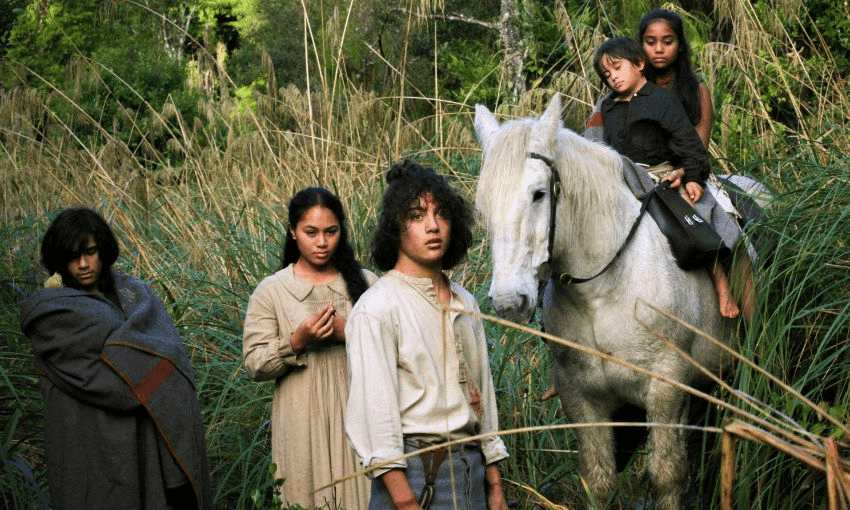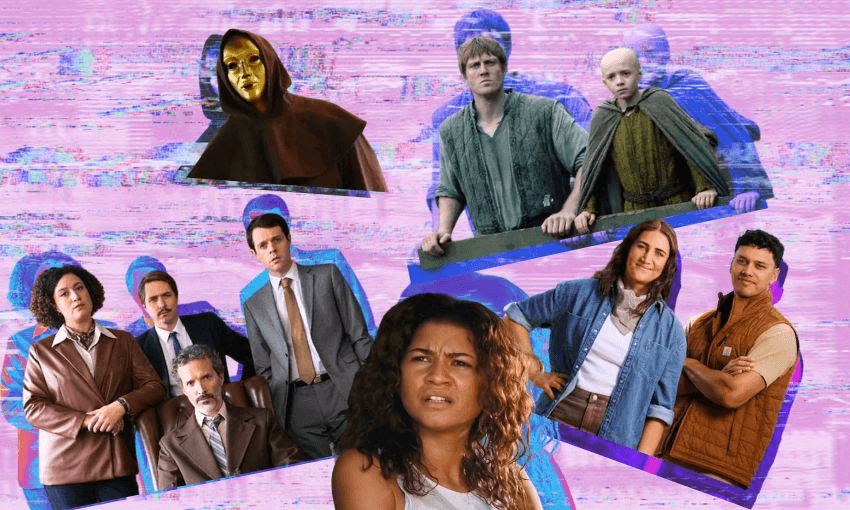Review: After seeing so many films where Māori struggle and die, Lyric Waiwiri-Smith wonders if it’s time to make something different.
Ka Whawhai Tonu, a cinematic retelling of the 1864 battle of Ōrākau Pā starring Cliff Curtis and Temuera Morrison, is just OK. There’s colonial tension, some patu bashing, a magic gecko and a lot of bloodshed, but other than that it’s mostly just OK, and maybe we should start thinking about other aspects of Māori life that are also worthy of storytelling.
The film centres on two rangatahi – Haki (Paku Fernandez (Ngāti Porou, Ngāi Tahu)) and Kōpū (Hinerangi Harawira-Nicholas (Ngāi Tūhoe)) – whose lives are caught up in warfare and colonisation. Both teenagers have reason to feel disconnected from their environment: Haki, the son of a Pākehā soldier, is treated as an other due to his bloodline, while Kōpū contends with the weight of being a mouthpiece for Tūmatauenga, the Māori atua of war, and her mother, Tūrama (Miriama Smith (Te Arawa, Tūwharetoa)).
The battle of Ōrākau Pā is perhaps one of the most famous conflicts of the New Zealand Wars, yet most New Zealanders won’t be familiar with the name, nor the venerable Ngāti Maniapoto chief who led the battle, Rewi Maniapoto (Morrison (Ngāti Whakaue, Ngati Maniapoto)). It was Maniapoto’s response to a British Lieutenant calling on him forfeit that was eventually immortalised by the late historian Ranginui Walker: “Ka whawhai tonu mātou. Ake! Ake! Ake!” We will fight on, forever and ever.
Marketing for Ka Whawhai Tonu leans on the fact there are big names attached (Morrison, Curtis and Smith), but Fernandez and Harawira-Nicholas do most of the heavy lifting in this film. Against the backdrop of war, the rangatahi try to forge a friendship and an escape out of their shared social outcasting. But despite all the action, the drone shots of the Waikato, and the strange mysticism of Kōpū, Ka Whawhai Tonu is largely unremarkable. The romantic tension between myself and the guy I went on a date with to see this film was more dramatic and riveting than the movie itself, and we never even made it to a second date.
There were some great aspects to Ka Whawhai Tonu – extensive researching and a personal connection from much of the cast means this film stays very true to its real life inspiration despite creative flairs, and the built-to-scale pā used as a set brings the trench warfare and anxiety of the battlefield to life. The film’s dialogue is 95% te reo Māori, though at one point a character’s reo was translated as “bro” in the film, and I had to wonder whether in 1864 we were really using “bro” like that, but I respect a bit of artistic licence if it sounds or looks cool (like the magic gecko).
I came into the theatre with high hopes for this film, but left with just one. While watching the dead bodies of Māori soldiers pile up, I couldn’t help but wonder if I’m the only person left who doesn’t want to see any more films where we – Māori – are dying through the whole thing. We take a patu to the head from each other, a bullet to the chest from the white man, shed blood and tears over our losses both physical (loved ones, land) and immaterial (culture, spirit), and then the film ends with a grim slideshow which recounts the almost two-hundred-year-long period of colonisation in Aotearoa since the 1800s: land loss, a massive decrease in Māori population, and ongoing colonial trauma. Then the lights in the cinema go up.
Needless to say, it’s kind of depressing. Films like these provide that missing piece to understand our complicated colonial history we didn’t learn in school, and remind us of the reality and persisting effects of colonisation in New Zealand. But as Māori, many of us are already aware of the impacts of colonisations, because we still live it every day.
It’s not just Ka Whawhai Tonu: earlier this year, Lee Tamahori (Once Were Warriors) released The Convert, an action-packed period piece set in 1830s Aotearoa-Te Waipounamu which stars Guy Pierce as a British lay priest who by the end of the film has his own Māori wife and tā moko. Pierce’s character development centres on him learning about humanity through the struggles of the Māori around him. They suffer, and for their sins he learns something that makes him a better person.
Much more interesting than Pierce’s character was the storyline of Rangimai (Tioreore Ngatai-Melbourne (Ngāti Porou, Ngai Tūhoe)), whose expressions of grief following incredible loss reveals more about what it means to be Māori than anything else in the film. It’s a shame we couldn’t have had a full film on her life, and the day-to-day lives of other Māori women during that era. This movie was just OK too, probably not as good as Ka Whawhai Tonu, but still just OK.
A lot of stories told about us, including the ones told by us, are often incredibly challenging tales which invoke a lot of difficult emotions and reflection. There’s 2022’s Cousins, about three women from the same whānau whose lives have been forced apart by the systemic challenges, and 2017’s Waru, an anthology of short films about a Māori boy who is killed by his caregiver. Ka Whawhai Tonu isn’t even Curtis and Morrison’s first NZ war film together: they both previously starred in 2005’s River Queen. Overhanging all of this is the dark shadow of Once Were Warriors, a film which has taken as much mana from Māori as it has supposedly given.
Calling for less historical Māori media in 2024, given how many strides we’ve taken to get here and the obstacles we still face day-to-day, does seem pretty regressive. But I’m not saying let’s get rid of it altogether, I’m just wondering why we choose the same themes when we tell stories about ourselves.
These films fill the gaps that have existed in our education systems, and provide a point of reference for Pākehā who feel unfamiliar with te ao Māori. For urban Māori disconnected from their culture, they also provide a chance to discover more about whakapapa. Historically, New Zealand has been disgracefully lax when it comes to remembering and honouring Māori history, but with the release of Ka Whawhai Tonu, The Convert, Whina and Muru in recent years, appetites appear to be changing. RNZ has a fantastic five-part series on the NZ Wars, covering stories from Ruapekapeka, Waitara, Tainui, Wairau and Tauranga Moana. Their series is incredibly well-researched and portrayed, and you even get to see Mihingarangi Forbes running through some fields.
I’m starting to suspect that whoever is on the funding board at the New Zealand Film Commission must see the words “Māori”, “historical” and “war” in a pitch, and immediately green-light the project. For The Convert, the Film Commission offered a total of $9,591,792 in funding across film production and script development, while Ka Whawhai Tonu received $2,565,000. It makes sense, because historical Māori war films cover a lot of the bases New Zealand films need to be considered “local”.
Instead of another film where Māori are dying in the Waikato, I think we need something more fun, like Sione’s Wedding but with a bunch of cousins from Northland. Or a mystery-thriller set in a garage party in West Auckland. An enemies-to-lovers rom-com about two beefing hāngī makers (starring Curtis and Morrison, and yes they have to kiss). A sci-fi film for which the moodboard is simply the album artwork to Pātea Māori Club’s Poi E. A coming-of-age flick about young kapa haka performers who realise they’re getting worked like the navy and life really isn’t that serious at age 16. I’ve just provided five great pitches (copyrighted) here, so hopefully the Film Commission signs off on at least one of them.
Maybe Ka Whawhai Tonu was actually an excellent film, and I’ve just seen enough dead Māori bodies on screen this year. Maybe my tūpuna will spiritually smite me for getting too lippy, because nothing is gained when a story isn’t shared. Either way, I’ll be waiting for Hemi’s Tangi, the dark comedy Māori cousin to Sione’s Wedding.



